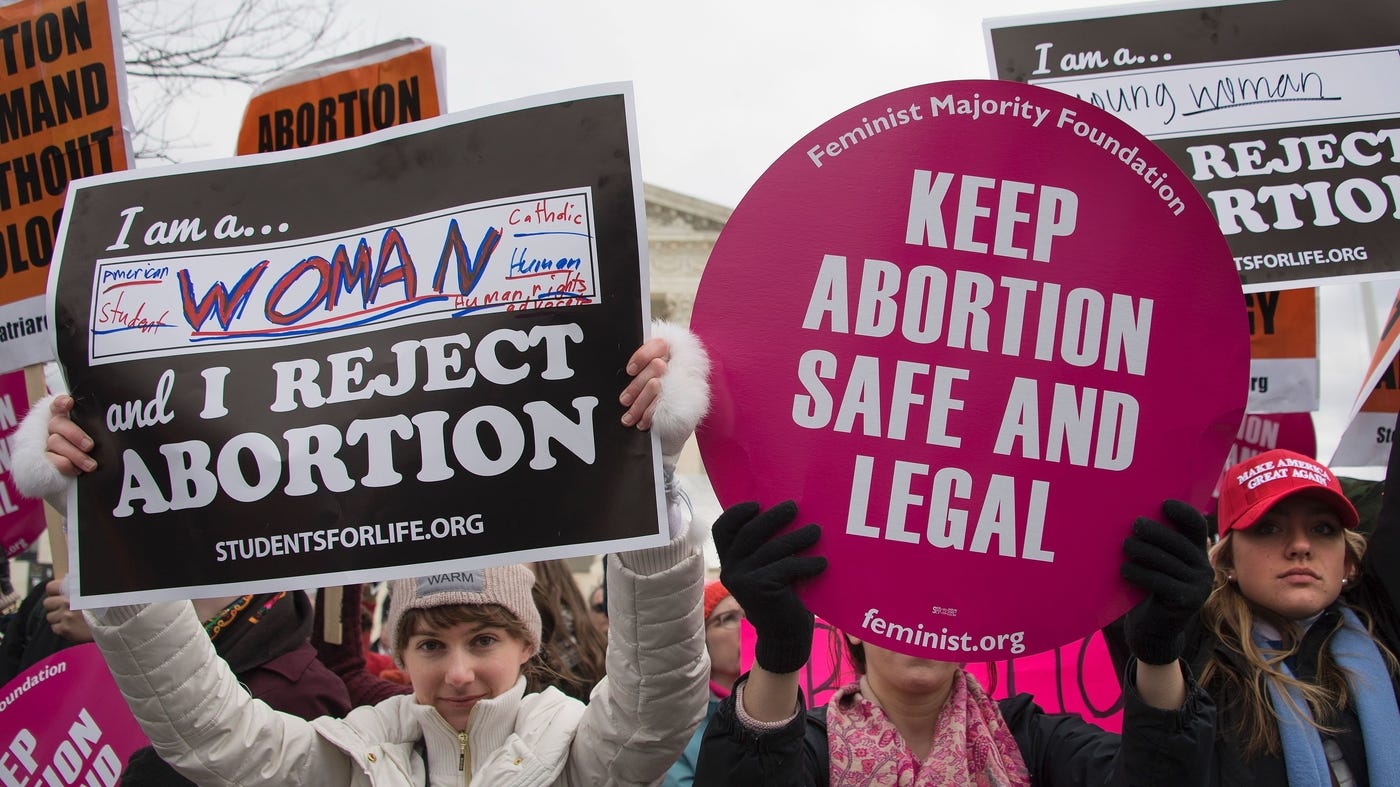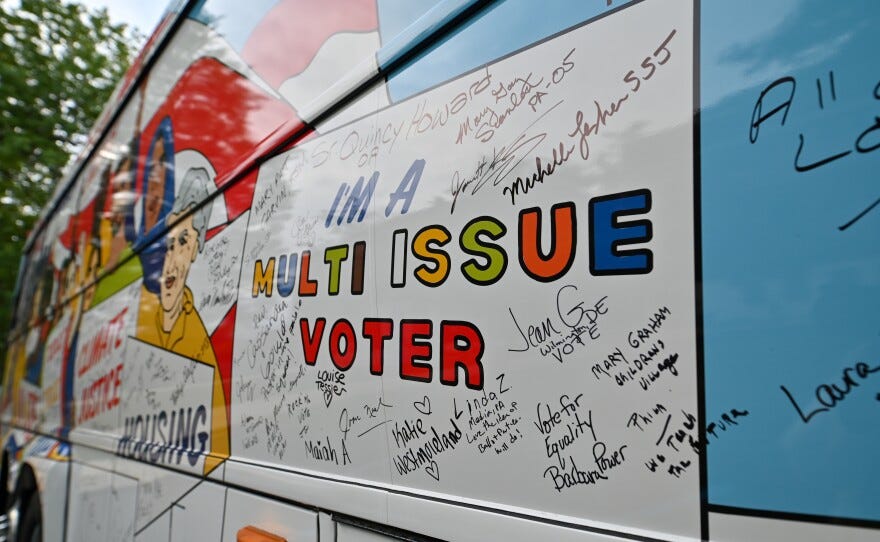Jemar Tisby: Advice For Single Issue Voters
Is this you?
Let’s be honest: a large percentage of Americans are single issue voters.
And we know what the most common single issue is. Abortion.
You might bristle at the idea of being labeled a single issue voter. You might say, “I care about more things than abortion — I care about the economy, immigration, international relations, etc.,” but ultimately, large numbers of people will not vote for a candidate who does not align with their views on abortion.
This year, the American Values Survey, conducted by the Public Religion Research Institute (PRRI), a nonprofit, nonpartisan research center, asked people about what would make or break their support for a political candidate.
They found that 56% of Democrats, 36% of Republicans, and 35% of independents say they wouldn’t vote for a candidate with beliefs that don’t align with theirs on abortion.
These numbers have changed from 2020, when only 17% of Democrats and 32% of Republicans said this.
I talked to Jemar Tisby, a best-selling author, national speaker, faith leader, and public historian (you can buy his book, The Spirit of Justice: True Stories of Faith, Race, and Resistance, here, or follow him on Substack here) about single-issue voting, and how focusing on a single issue as a litmus test means that voters risk electing people who hold deeply troublesome stances in other areas or fail to exhibit the leadership qualities necessary for public office.
Single issue voting happens in every election. What have we learned from this type of voting in the past?
Jemar: The result [from the phenomenon of litmus test voting] is that politicians pander to specific single-issue voting blocs and choosing how to treat an issue based on public opinion rather than conviction.
We get elections where candidates take more extreme positions to try to outdo one another, and then often fail to do what they promised once they get elected.
You also get candidates who are unqualified for office, either by experience or character, but they gain support by holding the right stance on a single issue.
What are the consequences of single-issue voting?
Jemar: In reality, no issue can be understood in isolation; all issues are interconnected. Abortion, for instance, must take into account financial wellbeing, access to medical care, education about reproduction, religious freedom, and personal choice. Whatever one’s stance on the issue, there are other factors that should be considered.
Single-issue voting has resulted in political myopia. In their isolated focus on one issue, many voters overlook other relevant data in deciding how to cast their ballot.
Single-issue voting is reductive and constrains political choices. It binds and blinds voters when choosing who will represent them and their neighbors.
What would you say to someone who won’t vote for someone, even if they feel that person better represents their views in other ways, because of one single issue?
Jemar: Think about your desired outcome and see which party or candidate has the better chance of securing it.
Whether it is abortion, immigration, access to guns or something else, what does the data actually say? It could be that the other party has better results, but you never consider them because they don’t hold the “right” top-line stance.
The focus should not be a candidate’s perceived position on one issue, but whether the candidate’s platform, as a whole, is healthy for the nation and the community.
What other considerations should single-issue voters think about before casting their ballots?
Jemar: Single-issue voters should think about how their vote is affecting their neighbors, especially the poorest and most disempowered. We are not voting for the common good if our fixation on a single issue impinges on the rights of others or their opportunities to flourish.
Voters should think about how their focus on a single issue ties them to one political party for multiple election cycles and makes it more difficult to put forth a diversity of highly-qualified candidates.
The people of this nation are generally ill-served by single-issue voting, but if you must vote on a single issue in this election, then let it be democracy. Vote for the single issue of preserving and extending democracy over authoritarianism and the dismantling of democratic processes.
What would you say to a person of faith who feels like abortion is the single defining issue for any election?
Jemar: History helps us understand how abortion became the single issue for some Christians. But an anti-abortion stance has not always been widely accepted as the “truly” Christian stance.
In 1971, the Southern Baptist Convention, the nation’s largest Protestant denomination, passed a resolution on abortion that called upon Southern Baptists “to work for legislation that will allow the possibility of abortion under such conditions as rape, incest, clear evidence of severe fetal deformity, and carefully ascertained evidence of the likelihood of damage to the emotional, mental, and physical health of the mother.”
A poll in 1970 discovered that 70 percent of Southern Baptist pastors “supported abortion to protect the mental or physical health of the mother, 64 percent supported abortion in cases of fetal deformity and 71 percent in cases of rape.”
While abortion is a critical issue, it hasn’t always been the singular issue. Who began broadcasting that narrative, when, and to what purpose?
You don’t have to give up your sincere conviction that life in the womb should be protected if you vote for a pro-choice candidate. Your vote in this election can be in support of democracy, integrity, and accountability in our elected officials. And you can still work to protect life from womb to tomb.
Tensions are incredibly high this year. People on both sides of the aisle feel threatened by views held by the opposing party. It’s scary to think that things we hold dear could be taken away. And I get that sometimes it feels like one topic is overwhelmingly more important than any other.
But what would happen if Americans were to view a candidate comprehensively, as Tisby suggests? What if we looked at how the two major parties actually affect change on the topics you care most about? Which party or candidate’s policies actually move the needle on things like poverty, which is one of the biggest drivers of abortion, gun violence, and crime? What if we spent time researching, not just what a candidate says they want to accomplish, but how well Party A or Party B has affected change on (fill in the topics you care most about here)?
If there is one issue we must care the most about, it is the principles of democracy, which outweigh any allegiance to a political party or preferred candidate. Because without democracy now, we cannot hope to make positive progress on the issues we care most about in the future.








Thank you so much for this! It felt a little bit like Jemar was peeking into my brain, as I grew up in the era where abortion was *the* issue for our faith community every election cycle and I do recall the feeling of blinders falling off when I learned more about the nuance of that particular issue (specifically the effect of banning abortion versus other policies that truly and more effectively reduce abortion rates) and recognizing the importance of so, so many other issues too.
Now I'm aligned with a political party for the purposes of voting in the primaries (and have changed that alignment based on which primary I feel more strongly about), and my single issue vote is for democracy. I vote for a mixed ticket every year, and hope to this year as well, but I can no longer support any candidate that doesn't meet the bare minimum threshold of upholding election results, or vote for any candidate who shares and supports authoritarian and retributive politics, and that goes all the way down the ballot.
Hi Sharon. Thank you for shedding light on an almost taboo subject among many communities. I am anti abortion but take a different approach. Here is something I wrote last night.
I humbly suggest that the church in the U.S., as a whole, has made a terrible mistake.
For decades we've been told that there was one supreme overriding issue that we must base our vote on, which is of course, abortion.
This created a huge and dependable voting block that could be enticed to support any candidate, without regard for other policies.
We were told that the enormous increase in the number of abortions after Roe v Wade, was a crisis calling for immediate and drastic action (numbers at the end).
That was true. Abortions went way up.
But politicians and church leaders only offered one option for that action: reverse the legality back to what it was. Only a law, and one that would punish anyone responsible, would be able to end the crisis.
So the church obediently spent the next 50 years campaigning to support pro-life candidates and telling ourselves that the righteous thing to do was to vote. We believed them.
During this time, we were also encouraged into abandoning other ministries so we could focus on this one. We are easily outraged, so we responded in kind.
When told the stranger wanted to kill and rape us, we believed it.
When told that the hungry were lazy, the poor were mean, the orphan needed discipline, the widow was a welfare queen, and the sick and dying were in God's hands, we believed it.
Jesus told us to not fear, yet fear, along with an easy, new-and-righteous mission to vote, caused the church as a whole, to publicly turn our back on all the other people Jesus specifically asked us to take care of, and focus only on a political endeavor.
Ironically, we were also told that only the church could do the work of God, and that our government should never get involved.
We should ask:
What if all the pro-life money, the campaigning, the volunteering - the efforts of decades - went towards ministering to mothers who were unbelievers instead of pointing the finger of condemnation at them?
If asked to make a choice between a long campaign to create a punitive law, or a long campaign of mercy and love, which do you think Jesus would want us to undertake?
We missed it. We missed the real solution.
And here are the numbers. Before the Dobbs decision in 2021 finally gave the church its long-sought goal, per capita abortions in the US were LOWER than they were in 1972, the year before Roe v Wade.
And somehow we still wonder why unbelievers are repulsed, and our children have rejected the good news we keep telling them about.